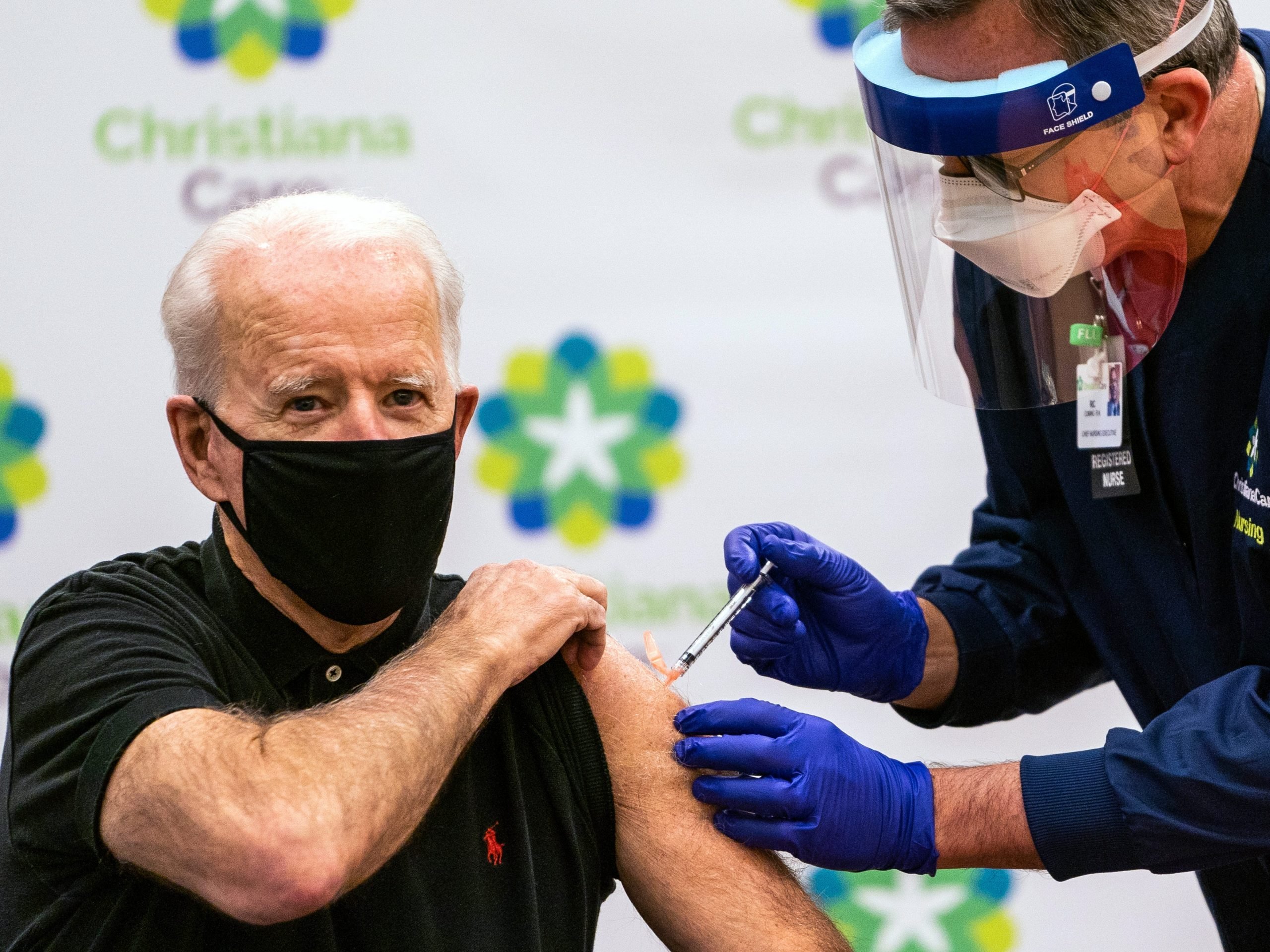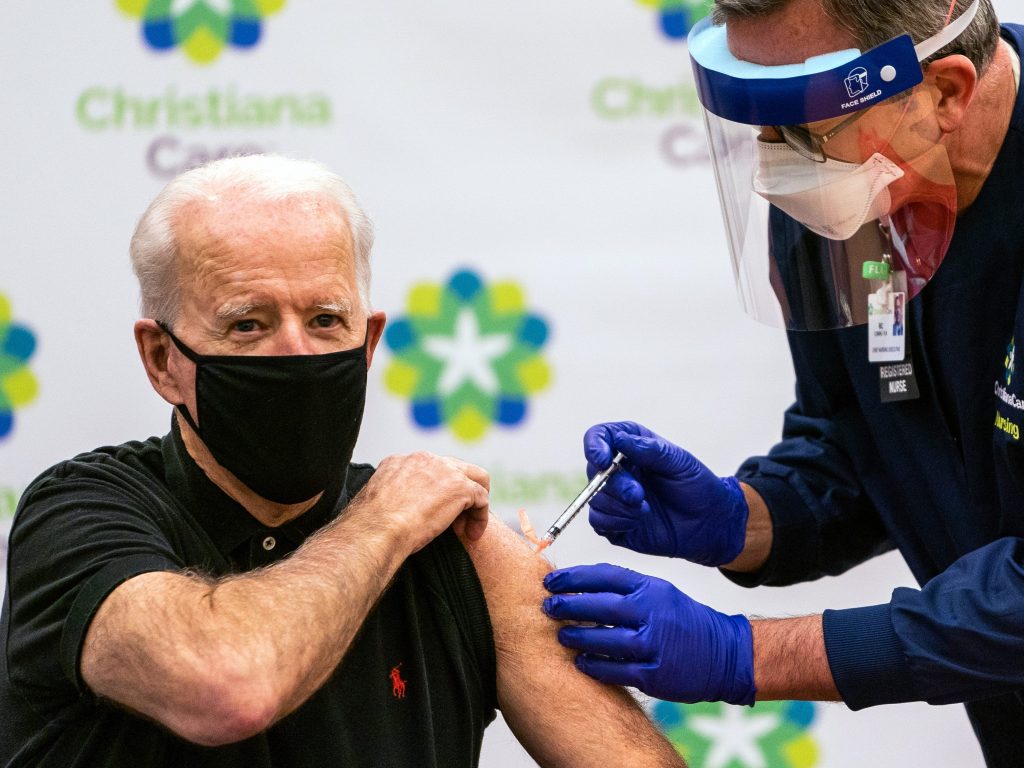Hello,
Welcome to Insider Healthcare. I'm Lydia Ramsey Pflanzer, and this week in healthcare news:
- We're reaching a critical moment in the debate over COVID-19 booster shots;
- We got the scoop that Commure has raised $500 million as digital-health startups continue to raise massive rounds;
- Big corporations like Walmart and Google are shaking up their healthcare teams in different ways.
If you're new to this newsletter, sign up here. Tips, comments? Email me at [email protected] or tweet @lydiaramsey125. Let's get to it…

President Joe Biden receives a coronavirus vaccine.
Demetrius Freeman/The Washington Post via Getty Images

Demetrius Freeman/The Washington Post via Getty Images
Vaccine boosters are facing a critical test
It's a big week in the conversation around COVID-19 booster shots.
The Food and Drug Administration's expert panel is meeting today to evaluate the evidence around Pfizer's booster shot. The panel will vote on whether to recommend the booster.
On Wednesday, the FDA released documents that gave us our most comprehensive look at the case for booster shots, including what side effects to expect with a third dose.
In the documents released that day, the FDA avoided taking a firm stance on boosters, and noted that Pfizer didn't evaluate how effective the boosters are.
The evidence around booster shots keeps unfolding in real time. Later on Wednesday, the New England Journal of Medicine published findings from an observational study of boosters in use in Israel. The results suggested older adults were far less likely to develop severe COVID-19 after a booster shot.
We'll be tuning in this week and next as the Biden administration's September 20 deadline for booster shots approaches, and as officials at the FDA and the CDC make their considerations.
But as Andrew Dunn writes, it sounds as if boosters are coming our way no matter what.
Read on>>
The COVID-19 booster debate is a mess. Here's why we'll probably get extra shots anyway.

Tia cofounders Felicity Yost and Carolyn Witte.
Tia

Tia
Startups are raising hundreds of millions
After what felt like a quieter summer, startups are back to raising money hand over fist.
Blake Dodge on Thursday broke the news that digital health startup Commure has raised $500 million and now has a a $3.5 billion valuation as it looks to unlock healthcare data.
Meanwhile, George Church has cofounded a startup looking to bring back the wooly mammoth. The startup, Colossal, has raised $15 million.
And Megan Hernbroth got a look at the presentation that women's healthcare startup Tia used to raise $100 million in its latest round.
Check it out>>
See the 30-slide presentation a women's healthcare startup used to raise $100 million one year after losing all its revenue 'overnight' because of COVID-19

From left to right: Shwetak Patel, Aashima Gupta, James Park, and Karen DeSalvo
Google; Marianne Ayala/Insider
We're keeping tabs on leadership changes within corporations' health bets

Google; Marianne Ayala/Insider
This week, we chronicled the leadership changes inside two big companies' health bets.
First, Shelby Livingston had the scoop that Walmart's healthcare team is shaking up its leadership amid a slow rollout of health clinics. Two top leaders are switching to other roles.
Then, Blake, Hugh Langley, and Jade Khatib teamed up to pull together a list of the healthcare leaders still with Google in the wake of the tech giant dismantling its health group.
After Google Health's chief, Dr. David Feinberg, left for a role as Cerner's CEO, here's who's still in charge of some of Google's key health projects.
Get the full list>>
Meet the 20 people leading Google's most promising health bets as the company overhauls its plan to take on healthcare
More stories that kept us busy this week:
- We took a closer look at how China quietly grew into a biotech powerhouse that will shape the future of the drug industry.
- Megan Hernbroth reviewed the Oura smart ring. (What do you guys think of product reviews? Should we review more products/services? It's been a while!)
- Andrew wrote about the potential for mRNA beyond vaccines.
- Shelby found that health-insurance giant UnitedHealthcare is paying doctors less than their costs to give COVID-19 vaccines to kids.
- Allison reports that Amylyx, the company helmed by two of biotech's youngest execs, are pressing the FDA to approve their promising drug for a fatal brain disease.
- Lydia
